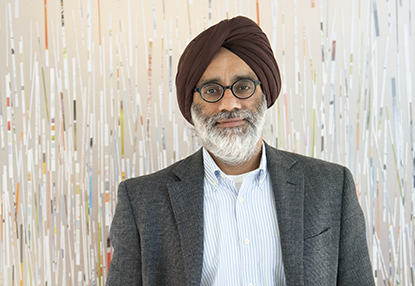Feature: Pandemic provides real-time, case-based learning for MPH students
By Crystal Mackay, MA’05
Part of what makes the Master of Public Health program at the Schulich School of Medicine & Dentistry unique in Canada is its case-based approach to teaching – instructors use real-world examples to encourage students to untangle the complexity of public health issues from a host of different perspectives.
For this year’s cohort, one of the most important public health cases of their lives is playing out in real time all around them, presenting valuable opportunities for learning.
One full year after COVID-19 was declared a global pandemic by the World Health Organization, students are reflecting on this extraordinary year in public health.
“We can see the situation developing, we can analyze it ourselves and we can discuss it with our instructors and classmates,” said Alexandra Romanski, 2021 MPH Candidate. “We can look at the measures being implemented, talk about why they are being implemented and the decision-making behind that process.”
She says one of the biggest takeaways from the pandemic is that in public health there is rarely one right answer. That's a lesson classes from years past always come to understand by the end of their time in the program, says MPH Director Dr. Amardeep Thind. But never before has that lesson been distilled in such a clear way.
 “When students come into the program they are looking for certainties, but in public health you have to become comfortable living in a sea of grey, where decisions have to be made with incomplete or conflicting information,” Dr. Thind said. “The pandemic really has brought that to the fore. There are multiple different ways to come at any problem.”
“When students come into the program they are looking for certainties, but in public health you have to become comfortable living in a sea of grey, where decisions have to be made with incomplete or conflicting information,” Dr. Thind said. “The pandemic really has brought that to the fore. There are multiple different ways to come at any problem.”
For MPH student Hao Ming Chen, the pandemic as a case-study has opened his eyes to the overlapping and sometimes conflicting priorities at play when considering the overall health of a population. While the main focus is on the virus itself, the impact on a person’s social environment and how that affects their overall health also have to be considered, he said.
“The pandemic really made me see how all the different components of this issue – things like policies, decision-making, economics, housing – have a huge role in the wellbeing of individuals and the health of the community and beyond. Public health as a whole is very complex and spans multiple different areas.”
When Romanski first applied to the program in January, 2020, the word “coronavirus” was still a murmur in the media – something Canadians still felt fairly disconnected from. When she started her studies in September, the second wave of the pandemic in Canada was starting to take hold.
The pandemic has thrust public health professions into the limelight like never before, she said.
“I remember telling people at the time that I was applying to a master of public health and had to explain what it was. Now, everyone knows what public health is and it’s something that is impacting our everyday lives. Public health really has become front and centre.”









